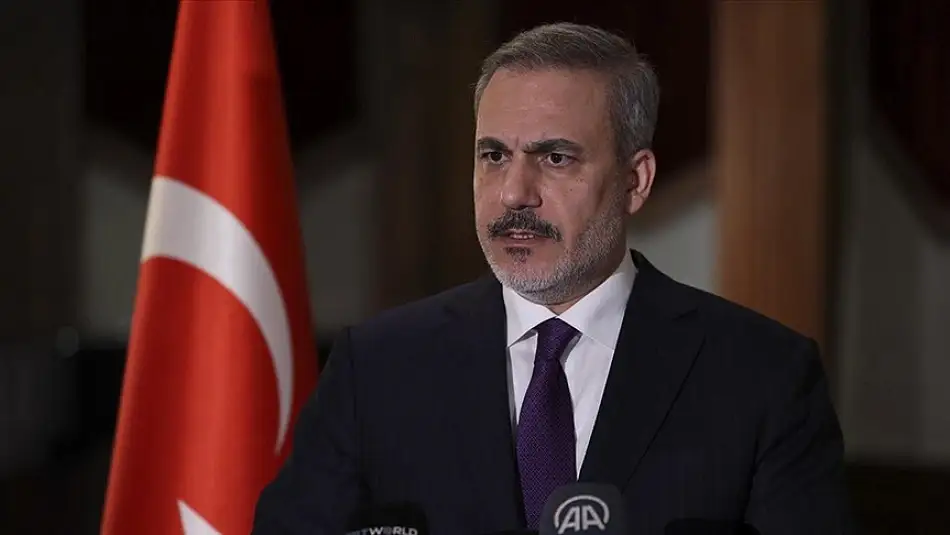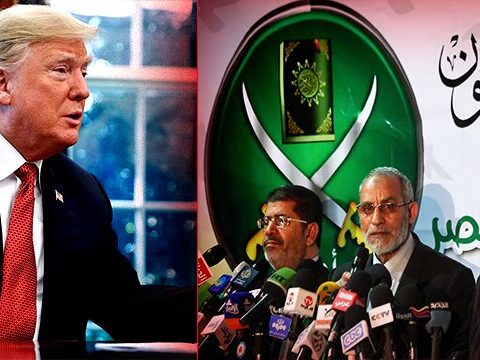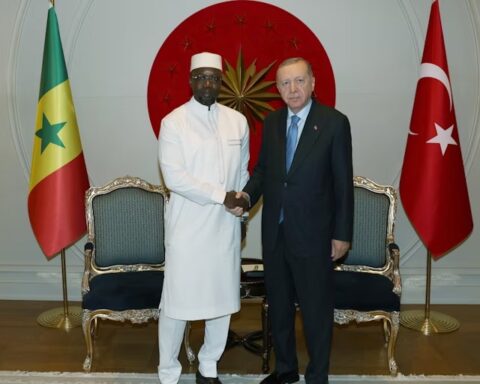The transformation in Türkiye’s foreign policy over the past decade has enhanced not only institutional structures but also the strategic influence of individual actors. In this context, Hakan Fidan stands out as a distinctive figure who blends intelligence experience with diplomatic tradition. His discourse reflects the rhetorical, theoretical, and strategic dimensions of Türkiye’s efforts to reconstruct its global role. Considering that he assumed office on June 4, 2023, he has now been serving for two years. Given the highly diverse political and geopolitical challenges encountered during this period, it is important to analyze the increasingly visible discourse of Fidan. Based on the concepts, tone, style, and relational patterns he employs, it is possible to identify seven main themes.
From Intelligence to Diplomacy
Hakan Fidan’s extensive experience as the head of the National Intelligence Organization (MİT) shapes his foreign policy discourse with a strong security reflex. He views foreign policy not merely as a field of diplomatic courtesy, but as one intricately tied to security, stability, and state capacity. This approach emphasizes covert diplomacy, implicit balancing, and long-term strategic planning. His frequent reference to a “data-driven state mind” in his discourse can be interpreted as an indication that decisions are based on analysis and information rather than reactive impulses. His intelligence background clearly reflects a language of moderation, indirect expression, and strategic caution. Transitioning from such institutions to diplomacy brings with it a strategic posture that merges technical thinking with balanced communication. This can be defined as a security-centered state mind. In a global context where security concerns are on the rise, and intra- and inter-alliance relations increasingly need to be defined through the lens of security rather than norms and political priorities, such a background and perspective may indeed be seen as an asset.
At this point, it is worth paying attention to two issues. The first is the possibility that the reflex of secrecy, inherent to intelligence work, might undermine the dimensions of diplomacy, interaction, and perception management in foreign policy. Just as secrecy is necessary and indispensable in intelligence, a corresponding level of openness—mindful of operational concerns—is equally essential in diplomacy. Advancing foreign policy through transparent relationships and open communication can positively shape public perception. However, if this openness is insufficient and secrecy and caution driven by an intelligence reflex dominate, this could prevent positive actions from being recognized and appreciated, while also creating the risk of a vacuum being filled by other elements.
The second issue is the risk that prioritizing security, as a continuation of the intelligence reflex, may disrupt the balance between state and society/citizens, and between freedom/democracy and security, in favor of the state and security. This imbalance could lead to the bureaucratic identity overshadowing the political identity. Ultimately, the ministry is a political office.
Strategic Autonomy and the New Multipolarity
One of the most striking elements in Fidan’s discourse is the portrayal of Türkiye as an independent and autonomous actor within the global system. The concept of “strategic autonomy” refers to Türkiye’s pursuit of a flexible and multidimensional path rooted in its own interests. This discourse conveys Türkiye’s aspiration to act as a balancing power in the “new multipolar” world order and its vision of a “more just world.”
This approach has been clearly observed in Türkiye’s mediation role during the Russia-Ukraine war and its stance in the NATO accession processes of Sweden and Finland. While being a member of the Western bloc, Türkiye is actively striving to align its position within the alliance with its own national priorities. Furthermore, its participation as an observer in Eastern-oriented platforms such as the Shanghai Cooperation Organization is also indicative of this strategic flexibility.
Fidan’s statements reflect not only geopolitical adaptability but also the adoption of a moral stance that resonates with the Global South, Africa, the Middle East, and other parts of Asia. This is likely why concepts such as “balance,” “justice,” and “equality” frequently appear in his discourse.
Institutional Continuity and Technical Transformation
While continuing the foreign policy vision shaped under President Erdoğan’s leadership, Fidan also places strong emphasis on institutionalizing and technically advancing this vision. In this context, he attributes the continuity of state reasoning not to individual preferences but to institutional capacity. For instance, his statement that “Türkiye’s foreign policy is not shaped by daily developments” simultaneously conveys a commitment to stability and institutional seriousness. This holistic approach signals a move away from the personalized diplomacy of the past and toward long-term planning. His avoidance of personalized rhetoric in foreign policy is especially evident in statements directed at the public.
Fidan’s emphasis that decisions are made with “state wisdom” and through “institutional coordination” conveys the message that foreign policy is guided by institutional strategy rather than individual preferences. In this regard, there is a noticeable tendency to reinforce institutional memory and strengthen professional diplomatic staff in the decision-making process. The approach he follows also reflects a model of state governance that prioritizes foresight, consistency, and legal legitimacy. However, bureaucratic reflexes that have not been filtered through a political lens and an overemphasis on theoretical frameworks may give rise to other challenges. His bureaucratic background makes him more capable of recognizing these potential issues.
A Layered Approach to Regional Politics
Fidan’s discourse on regions such as Syria, Iraq, the Caucasus, and Africa encompasses not only a security-focused perspective but also themes of state-building, stabilization, and multilateral cooperation. Phrases like “respect for the territorial integrity of neighboring countries” and “joint fight against terrorism” indicate that Türkiye values not only its own security but also the broader regional order. This layered approach reveals an appreciation for the complexity of regional realities, favoring nuanced strategies over simplistic solutions, and positions Türkiye not merely as a participant but as a key architect in shaping regional order. For instance, in Syria, a policy is being pursued that simultaneously addresses security, humanitarian aid, and political resolution. In Iraq, Türkiye engages with the central government, the Kurdish Regional Government, and Turkmen communities concurrently, reflecting an adoption of a multi-actor diplomatic model.
Silent Power: Technical and Balanced Discourse
Fidan’s language is technical, calm, and measured, steering clear of emotional or populist rhetoric. He frequently uses terms such as “rational analysis,” “balance policy,” and “geostrategic necessity.” This tone is intended not to incite the public but to inform and clearly define Türkiye’s position. In this respect, his discourse can be considered a strong example of the “silent power” concept. The silent power approach centers geopolitical rationality over emotionally charged, conflict-driven language. His public statements are primarily based on technical data, international legal norms, and the notion of balance. This ensures that foreign policy is conducted with institutional seriousness rather than being dramatized in the public sphere. His personal demeanor also reinforces this mode of communication. Nevertheless, it is evident that combining technical information with statements that clarify the political position on the issue is also essential.
Türkiye’s Assertion of Global Agency
Fidan’s discourse indicates an effort to position Türkiye not merely as a regional power but as a global actor. With expressions such as “game changer,” “peace builder,” and “balancing power,” he emphasizes that Türkiye is not a passive country but one that provides direction. In this framework, foreign policy is presented not only as a pursuit of national interests but also as a vision grounded in the principles of global justice, equal representation, and multilateralism. Particularly in its Africa initiative, the language employed highlights Türkiye as a global actor based on development, equal partnership, and institutional support. Through tools such as TİKA, the Maarif Foundation, and military cooperation agreements, Türkiye seeks to make its model visible in the non-Western world.
The rhetoric he uses suggests that Türkiye aims to gain visibility on the global stage by referencing its historical and cultural depth.However, it does so in a constructive tone rather than a confrontational one. At this point, a potential gap may emerge between Türkiye’s confident foreign policy language and the technical capacity needed to support its diplomatic and political capital. Factors such as the economic crisis limiting the state’s performance tools and the insufficiency of military capabilities to fully address high-level regional security risks suggest that this gap must be managed through diplomacy.
The Search for Legitimacy Based on International Law
Fidan’s discourse includes criticism of the selective application of international law. Türkiye’s operational moves are mostly supported by legal grounds such as the “right to self-defense” enshrined in Article 51 of the United Nations Charter. This approach aims to ground foreign policy decisions in law and strengthen their claim to legitimacy. It is further reinforced by critiques of the structural problems within the United Nations. In particular, the UN Security Council’s ineffectiveness in the face of civilian deaths in Gaza and the double standards of Western countries reveal a legitimacy crisis in the system. Türkiye’s actions during this period—such as opening humanitarian aid channels and calling for a ceasefire with reference to international law—are manifestations of this principled foundation in practice. At the same time, it strives to construct a rights-based narrative in response to the West’s double standards. In this way, the discourse rests on a strategic legal approach as much as it does on moral grounds.
An Assessment of Fidan’s Personal Stance and Strategic Identity
Fidan has emerged as an influential actor in international diplomacy, with a personal identity that aligns with the country’s political dynamics and is reinforced by his technocratic background rooted in intelligence. His indirect expression, law-based discourse, and search for balance set him apart from ideological or populist tones. It is evident that his discourse is shaped by three fundamental preferences. The first is technical seriousness—that is, a stance removed from political theatrics. The second is calmness—avoiding emotional appeals. The third is strategic caution—refraining from maximalist declarations.
On the other hand, references to universal norms such as democracy, freedom, or the rule of law are not particularly prominent in his discourse. This indicates a preference for a geopolitical and realist language in foreign policy rather than a normative one. While this approach may be fundamentally sound, it has drawn criticism, especially from Western counterparts and within the country.
His personal rhetoric reflects a shift in Turkish diplomacy from charismatic representation to institutional reliability. It represents a choice that favors institutional communication over symbolic politics. These qualities are reassuring for external counterparts who value predictability and professionalism. In a regional context dominated by turmoil and ostentatious leadership styles, Fidan’s “quiet” language is perceived as a sign of maturity and responsibility. However, this tone may also present certain drawbacks in domestic politics. By reinforcing his technocratic identity, it may delay the formation of a distinct political identity.
A Discourse Shaped by Geopolitical Reality
Hakan Fidan’s foreign policy discourse transcends the traditional frameworks of diplomacy. He transforms parameters such as security, institutional reasoning, geostrategy, and global pluralism into a distinctive language. What sets him apart is his refusal to view diplomacy as a zero-sum game. For instance, in the case of Syria, he emphasizes the need for a common strategy not only for Türkiye but, first and foremost, for Syria and all countries in the region—an important reflection of his inclusive approach.
This discourse is neither bound by ideological dogmas nor swayed by daily fluctuations. At the same time, it reflects a personal stance supported by strategic composure and institutional awareness. In an environment where security risks, regional national sensitivities, anxiety, fear, and expectations are running high, such a composed attitude can serve as a crucial anchor—both for Türkiye and for the broader region—against potential turbulence.
In fact, Fidan’s language is the language of geopolitical reality. However, grounding this discourse in a more inclusive and normative foundation could enhance its resilience against potential criticism. Making values such as democracy, human rights, and the rule of law more visibly present in the discourse would strengthen Türkiye’s global narrative power. Such an expansion would anchor foreign policy discourse not only in power and security but also in values and legitimacy. As Türkiye’s regional and global role is redefined, such a discourse becomes essential for consistency, impact, and sustainability.
Fidan strives to construct a foreign policy language that is calculated, institutionally consistent, and shaped by geopolitical awareness, rather than being rooted in confrontational or ideological assertions. His personal stance further reinforces this language: conscious, quiet, yet determined. This attitude has the potential to reshape the boundaries of Turkish diplomacy in the 21st century.






